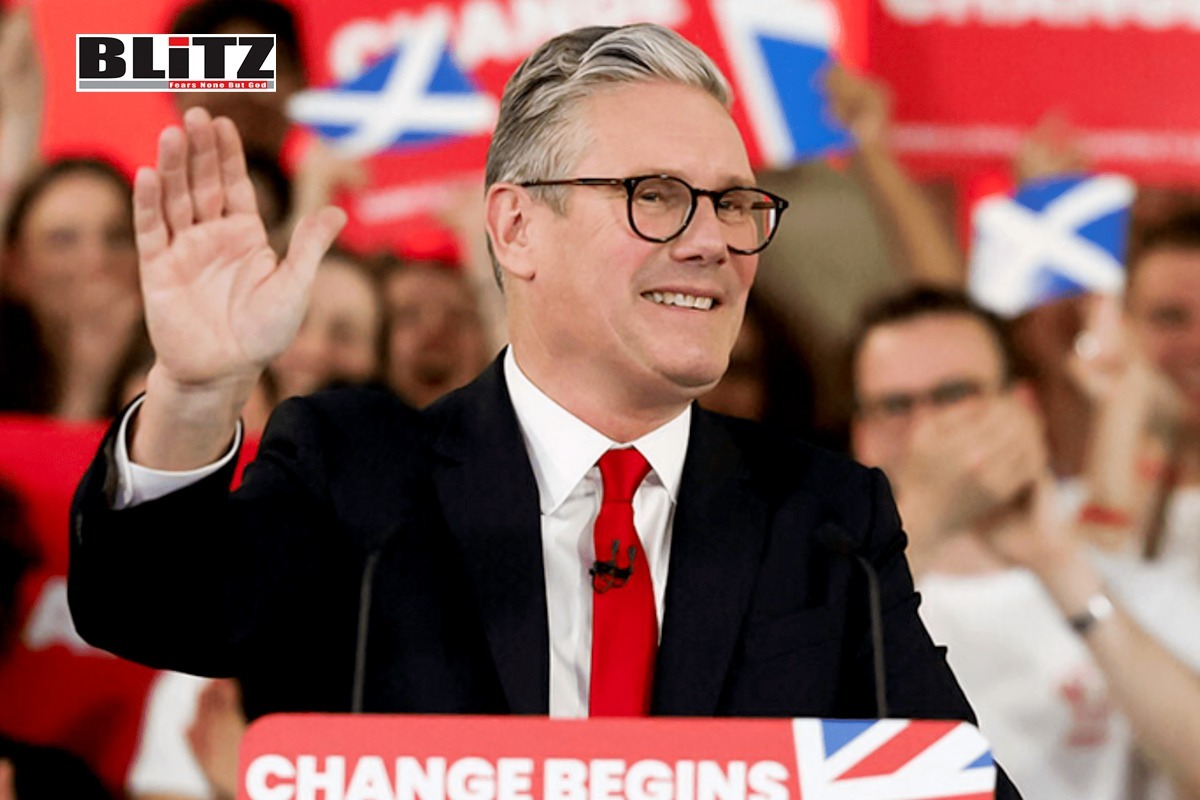Challenges and future prospects of Labour Party following landslide victory
- Update Time : Saturday, July 13, 2024

The British Labour Party’s decisive victory in the general election on July 4, 2024, marks a historic turning point in the UK’s political landscape, ending a prolonged 14-year period of Conservative rule. This early election, called by the outgoing Prime Minister Rishi Sunak, came against a backdrop of economic turmoil, political scandals, and a series of crises that have left the nation weary and seeking change. Labour’s triumph, under the leadership of Keir Starmer, is not only a mandate for change but also a challenge to deliver on high public expectations amidst substantial national issues.
Labour’s victory was overwhelming, securing an impressive 172-seat majority in the House of Commons. This landslide win is seen as a clear rejection of the Conservative Party’s governance rather than an unequivocal endorsement of Labour’s policies. Labour managed to secure 33.7 percent of the vote, a modest increase from the 32.1 percent they received four years prior under Jeremy Corbyn’s leadership. Despite this seemingly small margin, the UK’s electoral system translated this into a significant parliamentary majority, highlighting the deep dissatisfaction with the Conservative government.
One of the primary and most urgent issues confronting the new Labour government is the state of the National Health Service (NHS). The NHS has suffered from chronic underfunding, resulting in long waiting times, staff shortages, and deteriorating facilities. Political analyst Tim Bale of Queen Mary University of London emphasized the enormous financial investment required to revitalize the NHS, which remains a top priority for the majority of voters. In addition to healthcare, other critical infrastructure projects, such as transportation and housing, require immediate attention and substantial funding.
Labour’s economic strategy is centered around a comprehensive growth plan aimed at liberalizing planning laws to facilitate the construction of houses, factories, and infrastructure. This ambitious plan seeks to boost economic activity and, consequently, tax revenues, which can then be reinvested into public services. However, the feasibility and timeline of this plan remain in question. As Tim Bale noted, the critical issue is whether Labour can implement these changes swiftly enough to meet public expectations and deliver tangible improvements.
Prime Minister Keir Starmer has made several key appointments in his new Cabinet, signaling his commitment to addressing the nation’s challenges with experienced and capable leadership. David Lammy has been appointed Foreign Secretary, tasked with navigating the complex international landscape and rebuilding the UK’s global standing. Yvette Cooper takes on the role of Home Secretary, overseeing critical issues such as immigration, policing, and internal security. John Healey has been appointed Defence Secretary, responsible for the nation’s defense and military affairs.
Pat McFadden, Labour’s national campaign coordinator, becomes Chancellor of the Duchy of Lancaster, the most senior minister after the Prime Minister. Angela Rayner, Labour’s Deputy Leader, has been appointed Deputy Prime Minister and Secretary for Levelling Up, Housing, and Communities. Her dual role underscores the importance of addressing regional inequalities and housing issues, which were central to Labour’s campaign promises.
The outcome of the early elections was predictable to many observers, given the Conservative Party’s prolonged internal strife, policy incoherence, and lack of a clear vision for the future. The Conservative Party has seen three different prime ministers in the past five years, reflecting its instability and internal divisions. Rishi Sunak’s decision to call early elections was seen as an acknowledgment of the inevitable defeat, driven by internal pressures and the rise of the isolationist Reform UK party.
Labour’s path to victory involved a strategic shift toward moderation. Under Keir Starmer’s leadership, the party distanced itself from the radicalism associated with Jeremy Corbyn, offering reassurances to the establishment and the public. This moderation, coupled with the public’s frustration with Conservative rule, helped Labour secure its win. By presenting a more centrist and pragmatic platform, Labour was able to attract a broader base of support, including those disillusioned with the Conservatives but wary of radical change.
Labour’s victory in 2024 draws comparisons to Tony Blair’s “New Labour” triumph in 1997. Both victories came after long periods of Conservative governance and involved a strategic shift toward more moderate policies. However, significant differences exist. The 2024 election was more about the Conservative Party’s collapse than Labour’s success. Labour’s vote share increased only slightly, yet the electoral system magnified this into a substantial parliamentary majority.
In 1997, Tony Blair’s New Labour won with a clear and broad mandate, securing over 43 percent of the vote and a 179-seat majority. Blair’s victory was built on a comprehensive policy platform that appealed to a wide spectrum of voters. In contrast, Keir Starmer’s Labour won with a narrower vote share, reflecting a more fragmented political landscape and a greater focus on addressing immediate crises rather than long-term visionary policies.
Brexit remains a deeply divisive issue within British politics, influencing voter behavior and party dynamics. The Conservative Party has historically been split on Europe, with right-wing factions opposing closer ties and advocating for Brexit. This division contributed to the rise of Reform UK, which captured 14 percent of the vote in the recent election. Reform UK’s hardline stance on immigration, asylum seekers, and sovereignty echoes similar right-wing movements in France, Italy, and Germany, indicating a broader European trend toward nationalist and isolationist politics.
Reform UK has become a significant political force, drawing support from disaffected Conservative voters and those opposed to the Labour Party’s moderate stance on Europe. The rise of Reform UK reflects a growing sentiment of disillusionment with traditional party politics and a desire for more radical change, particularly on issues related to national identity and immigration.
The Scottish National Party (SNP) also faced significant setbacks in the 2024 election, losing most of its seats to Labour. The SNP’s decline, marked by internal disagreements, failed policies, and waning public support, suggests a decreasing appetite for a new referendum on Scottish independence. Labour’s resurgence in Scotland, where it increased its seats from two to 37, further underscores this shift and the potential for a more united UK under Labour’s governance.
The SNP’s decline mirrors the broader challenges faced by nationalist movements in Europe, where internal divisions and policy failures have undermined their credibility. Labour’s gains in Scotland represent a return to its traditional stronghold and an opportunity to address the concerns of Scottish voters within a unified UK framework.
Labour’s victory temporarily halts the rise of far-right extremism in the UK, but underlying issues remain. The presence of Reform UK and similar movements indicates that xenophobia, nationalism, and isolationism are still potent forces in British politics. Labour’s challenge will be to address these sentiments while delivering on its promises to improve public services, rebuild the economy, and restore public trust in government.
Keir Starmer’s leadership will be crucial in navigating these complex challenges. His ability to balance pragmatic governance with addressing the underlying causes of political discontent will determine Labour’s success in the coming years. The new government’s performance will be closely scrutinized, and public expectations are high. Delivering tangible improvements in healthcare, housing, and economic stability will be essential to maintaining public support and ensuring long-term political stability.
The Labour Party’s 2024 election victory represents a significant political shift in the UK, ending 14 years of Conservative rule and ushering in a new era of governance. However, the challenges ahead are immense. The new government must navigate economic hardships, restore underfunded public services, and manage public expectations while contending with the ongoing influence of right-wing extremism and nationalist sentiments. How Labour addresses these issues will shape the UK’s political landscape for years to come, and the party’s ability to deliver on its promises will be the ultimate test of its mandate to govern.
















